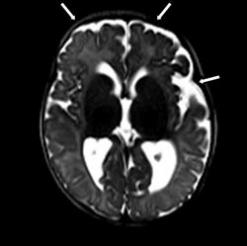Macrocephaly (or "big head") is a very common reason for referral to a pediatric neurosurgeon. Children with macrocephaly have a head circumference (the measurement around the widest part of the head) that is greater than the 98th percentile. Sometimes a large head means that there is a problem in the brain that might require surgery.
Evaluation
Your pediatric neurosurgeons will take a careful medical history of your child, including past head measurements provided by your pediatrician. It is also important to know if other members of your family also have large heads. A neurological exam will also be performed.
Your child's pediatrician may have ordered special tests to look at the brain known as an ultrasound or computed tomography (CT) scan. If not, a special test, called a Quick-Brain MRI (magnetic resonance imaging) may be ordered to evaluate your child's brain. This test looks for extra fluid in the brain (also known as hydrocephalus), which would require treatment. This is a radiologic test very similar to a CT scan but does not require radiation. It takes about 10 minutes to complete.
Children with macrocephaly may have a small amount of fluid between the brain and skull. This is sometimes referred to as "benign extra-axial collections of infancy or benign external hydrocephalus." This is a very common finding in children with large heads and usually requires no treatment other than careful follow-up. Most children outgrow this extra fluid by early childhood.
Additional evaluation may be necessary if there are any concerning findings on history, physical exam, or radiographic imaging.
Follow up
Most children with macrocephaly and a normal Quick-Brain MRI will be scheduled for a repeat evaluation and head measurement check in three months. Repeat imaging is usually not needed at that time. In addition, your pediatrician will keep a close eye on your child's head measurements and alert your neurosurgeon if there are any new concerns.
Parents should watch their children and report any of the following to their pediatrician or neurosurgeon:
- A bulging soft-spot (fontanel)
- Vomiting or poor feeding
- Abnormal eye movements
- Excessive sleepiness
- Excessive irritability
Page reviewed on: Nov 19, 2009
Page reviewed by: Susan R. Durham, MD, MS
